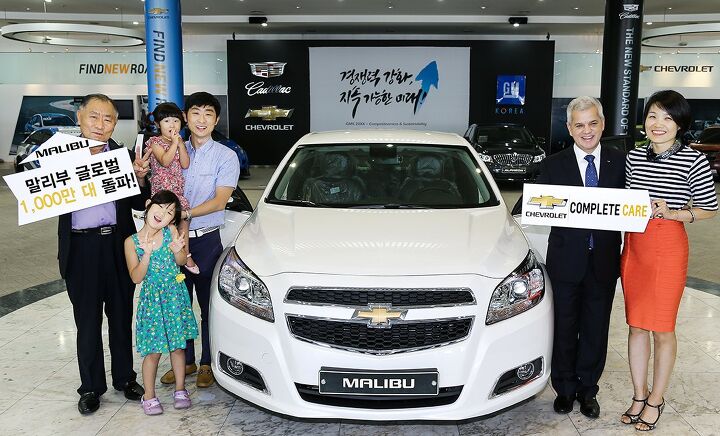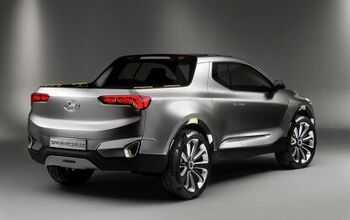U.S. Attempts to Convince South Korea to 'Buy American'

Officials from the United States and South Korea held a special session in Washington on Wednesday as part of U.S. Trade Representative Robert Lighthizer’s request to consider amending the two countries’ trade agreement. The joint talks serve to reassess the countries’ five-year pact, with the Trump administration aiming to diminish America’s growing trade deficit with South Korea.
One of the largest issues concerns the automotive industry. Korean rules stipulate a cap on the number of vehicles U.S. automakers can bring into the country each year that adhere to the country of origin’s safety standards. Presently, that quota sits at 25,000 vehicles per manufacturer. However, no U.S. company has ever made full use of the quota. General Motors, which is the most popular U.S. brand in South Korea, only sold 13,150 domestically built units in 2016.
Still, Western officials are expected to pressure South Korea into permitting more vehicles into the country in hopes of closing its $17.6 billion trade deficit with the Asian nation.
The talks are a second attempt between the countries to reach an agreement after an initial meeting in August ended in a stalemate. Korean officials are rumored to have been less than interested in revising the agreement, made during the Obama administration. But what good raising the cap on the number vehicles exported from the United States would do is unclear when no automaker has yet to reach it.
In Korea, U.S. imports are seen as inferior to most German brands in terms of sophistication, fuel economy, and build quality. Japan has a similar outlook on American automobiles that has influenced the country’s buying trends for ages. The silver lining is that American-made EVs don’t seem to suffer from the same stigma as internal combustion cars. Chevrolet’s Bolt received a warmer than expected welcome in the Korean peninsula while Tesla dealers have a six-month waiting period for anyone who wants to test drive one of its vehicles. It’s actually quicker just to purchase one and have it shipped over.
With more electrics forthcoming, Korea’s appetite for U.S. autos could grow. So, assuming a hot ticket American model does hit the 25,000 unit quota in the years to come, problems could arise. It could cost millions of dollars for a single model to be modified in order to meet Korean safety standards and the likelihood of that contingency occurring has grown. South Korea imported a total of 13,669 cars from the United States in 2011, but that number had grown to 49,096 units by 2016.
[Source: Bloomberg] [Image: General Motors]

A staunch consumer advocate tracking industry trends and regulation. Before joining TTAC, Matt spent a decade working for marketing and research firms based in NYC. Clients included several of the world’s largest automakers, global tire brands, and aftermarket part suppliers. Dissatisfied with the corporate world and resentful of having to wear suits everyday, he pivoted to writing about cars. Since then, that man has become an ardent supporter of the right-to-repair movement, been interviewed on the auto industry by national radio broadcasts, driven more rental cars than anyone ever should, participated in amateur rallying events, and received the requisite minimum training as sanctioned by the SCCA. Handy with a wrench, Matt grew up surrounded by Detroit auto workers and managed to get a pizza delivery job before he was legally eligible. He later found himself driving box trucks through Manhattan, guaranteeing future sympathy for actual truckers. He continues to conduct research pertaining to the automotive sector as an independent contractor and has since moved back to his native Michigan, closer to where the cars are born. A contrarian, Matt claims to prefer understeer — stating that front and all-wheel drive vehicles cater best to his driving style.
More by Matt Posky
Latest Car Reviews
Read moreLatest Product Reviews
Read moreRecent Comments
- Probert They already have hybrids, but these won't ever be them as they are built on the modular E-GMP skateboard.
- Justin You guys still looking for that sportbak? I just saw one on the Facebook marketplace in Arizona
- 28-Cars-Later I cannot remember what happens now, but there are whiteblocks in this period which develop a "tick" like sound which indicates they are toast (maybe head gasket?). Ten or so years ago I looked at an '03 or '04 S60 (I forget why) and I brought my Volvo indy along to tell me if it was worth my time - it ticked and that's when I learned this. This XC90 is probably worth about $300 as it sits, not kidding, and it will cost you conservatively $2500 for an engine swap (all the ones I see on car-part.com have north of 130K miles starting at $1,100 and that's not including freight to a shop, shop labor, other internals to do such as timing belt while engine out etc).
- 28-Cars-Later Ford reported it lost $132,000 for each of its 10,000 electric vehicles sold in the first quarter of 2024, according to CNN. The sales were down 20 percent from the first quarter of 2023 and would “drag down earnings for the company overall.”The losses include “hundreds of millions being spent on research and development of the next generation of EVs for Ford. Those investments are years away from paying off.” [if they ever are recouped] Ford is the only major carmaker breaking out EV numbers by themselves. But other marques likely suffer similar losses. https://www.zerohedge.com/political/fords-120000-loss-vehicle-shows-california-ev-goals-are-impossible Given these facts, how did Tesla ever produce anything in volume let alone profit?
- AZFelix Let's forego all of this dilly-dallying with autonomous cars and cut right to the chase and the only real solution.


































Comments
Join the conversation
They are a smart people that's why the don't buy 'merican car. American cars suck.
Why don't we just sell some US made Corolla or Civic over there? Problem solved. If you want to sell American cars outside of US, stop designing them with retro styles that make no sense to them. Sure, some people think the 08 Camry as ugly and Corvette as good looking. Most foreigner think otherwise, maybe if you want to sell American cars there, design a few models for that market instead of dumping our design (that the Coastal US cities don't even sell well) there, no? p.s. Please fix the interior quality. I don't care for the "soft touch" material that is glued onto the dash and the painted plastic and electroplated chrome bits that will fall off and discolor in a few years. And if you absolutely have to use them, please line them up so it doesn't look like a $5 3-pack tupperware.